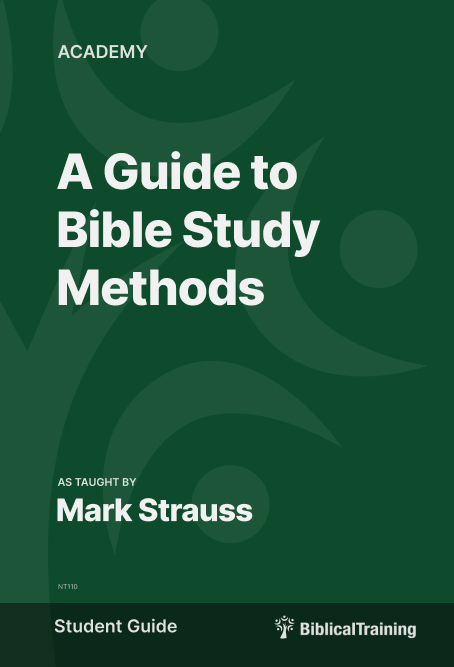Biblical Hermeneutics and Exegesis
About This Class
"Biblical hermeneutics" is the art and science of biblical interpretation. "Biblical exegesis" is part of the hermeneutical process as it is concerned to get the meaning out of the text. ("Ex" is a Greek preposition meaning "out of.") Both hermeneutics and biblical exegesis are an art because it can take a while to learn how to do it proficiently. It is a science in that there are specific rules that need to be followed. Dr. Strauss covers the four basic rules of biblical exegesis and then the ten steps to doing exegesis. He will also discuss how to do word studies and apply what you are learning.
About the Professor
Mark Strauss
University Professor of New Testament at Bethel Seminary

Lessons
It is important to recognize your presuppositions when you study and interpret the Bible. The writings of the Bible reflect diversity in authorship, genre and cultural background. The common theme that unifies the Bible as a whole focuses on the story of creation, fall, and redemption.
0% Complete- 0% Complete
Hermeneutics is the science and art of biblical interpretation. The science of hermeneutics provides methods, rules, and a measure of objectivity while the art of hermeneutics speaks to the skill that is learned through practice. The goals of exegesis are to determine the meaning of a passage in its original context, and to determine the significance of the passage for today.
0% Complete - 0% Complete
The first goal of hermeneutics is to determine the author’s intended meaning of the text. The interpretation process must take into account the genre of the literature and the historical and literary context. The meaning of the text controls our application. In this lecture, you will get a glimpse of the process of interpretation by looking at four principles of exegesis, the four steps we take to cross the bridge from our contemporary culture to the original context of the Biblical authors.
0% Complete - 0% Complete
In this lecture, we get into the practical details for how to exegete a passage. Dr. Strauss explains the first four (of ten total) steps for English Bible exegesis: 1) identify the genre, 2) get the big picture, 3) develop a thesis statement and 4) outline the progress of thought. This lecture teaches new skills and provides examples for you to put them into practice.
0% Complete - 0% Complete
The final six steps in the exegesis process are consulting secondary sources, analyzing syntactical relationships, analyzing key terms and themes, resolving interpretive issues and problems, evaluating your results from the perspective of wider contextual and theological issues, and summarizing your results. (At the 26-minute mark, the verse reference, John 14:6 should be John 14:26.)
0% Complete - 0% Complete
Dr. Strauss leads us into exploring the riches of Biblical words in this lecture. He explains some common misconceptions and gives us safeguards so that we do not wander into exegetical fallacies. If you want to know the way forward in Biblical exploration, then listen in as Dr. Strauss outlines the basic principles for doing Biblical word studies correctly.
0% Complete - 0% Complete
In this lesson, Dr. Strauss discusses two extremes to avoid when applying Scripture. He also gives us five principles to guide our contextualization of a particular passage. Listen in and grow in your ability to apply Scripture in your context to your life in meaningful ways.
0% Complete
Class Resources
Recommended Books
A Guide to Bible Study Methods - Bible Study
This guide is intended to be used with the free class from BiblicalTraining.org. Bible Study Methods
Recommended Readings
About BiblicalTraining.org
BiblicalTraining.org wants every Christian to experience a deep and loving relationship with Jesus by understanding the life-changing truths of Scripture. To that end, we provide a high-quality Bible education at three academic levels taught by a wide range of distinguished professors, pastors, authors, and ministry leaders that moves from content to spiritual growth, all at no charge. We are a 501(c)(3) non-profit funded by gifts from our users. We currently have over 180 classes and seminars, 2,300 hours of instruction, registered users from every country in the world, and in the last two years 1.4 million people watched 257 terabytes of videos (11 million lectures).
Our goal is to provide a comprehensive biblical education governed by our Statement of Faith that leads people toward spiritual growth.